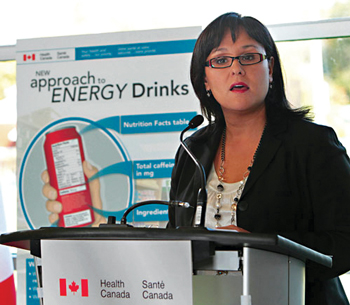Feds force new rules for energy drinks
Caffeine the “next epidemic,” says MRU health advocate
by Bryan Weismiller
Publishing Editor
Energy drinks will face new regulations following an announcement by the Government of Canada earlier this month.
Formerly classified as “natural health products,” energy drinks will be legally re-classified as food as they currently are in the United States and Europe. Beverage manufacturers will need to include ingredient, allergen and nutritional information on each can.

Health Minister Leona Aglukkaq made the announcement that energy drinks will be re-classified as food instead of "natural health products." Photo courtesy of the Government of Canada
Other changes include capping caffeine levels, adding warning statements and forcing producers to report consumer complaints.
Health Canada reports a number of cases of health problems associated with energy drinks, including irregular heartbeats and nervousness.
The changes could take 18 to 24 months, as “industry will be given time to adjust to these requirements,” according to files from Health Canada’s website.
In making the decision, Health Minister Leona Aglukkaq ignored recommendations from an expert panel for Health Canada. Postmedia News initially reported the panel had called for energy drinks to be renamed “stimulant containing drinks,” and re-designated as Schedule III under the National Association of Pharmacy Regulatory Authorities.
The re-designation would have meant energy drinks could only be sold in pharmacies. Thomas Yeung, who owns the Wyckham Pharmacy, said that move seemed unnecessary.
“I can’t imagine refusing the sale of something like energy drinks, in a normal instance,” Yeung said. “There might be the really off case where I’d say someone shouldn’t be buying it.”
“It’s always up to the consumer to be aware of what they’re putting in their body,” he added.
In September 2011, the University of New Hampshire announced they were banning the sale of energy drinks on campus. However, the decision was reversed three days later.
Brian Fleming, VP of campus life and student affairs at Mount Royal, said the university has no intention of banning or imposing its own regulations on energy drinks.
“It’s a free country,” Fleming said. “People get to choose what they drink. Though, I think we can have a role to educate people.”
Shermin Murji, health education co-ordinator at MRU said banning energy drinks on campus is “an interesting idea,” but added it may be ineffective as there are several other places to pick up caffeine-loaded beverages nearby.
Whether it be energy drinks, coffee or tea, Murji estimated nearly 90 per cent of the campus consumes caffeine in some form. She said she’s talked with students and faculty members who consume as many as four energy drinks daily.
“We find a lot of students going for an energy drink to coffee to something else that has caffeine like chocolate to keep trying to pick themselves up,” she said. “It’s about finding that middle ground where you’re not exceeding the amount you need.”
Murji noted caffeine has benefits such as increasing focus, but also warned of “damaging effects,” including dependence. She suggested exercise, meditation and healthy eating as effective ways of getting a similar buzz.
“Caffeine is the next epidemic,” she said. “It’s an addiction that I would say a lot of people have. It’s accepted because on every corner there’s a Starbucks or Tim Hortons.”
Energy drinks by the new law:
•Need to label ingredients.
•Cannot have more than 180mg of caffeine per serving (non-sealable can or sealable container under 591ml.)
•Are only allowed a maximum caffeine concentration of 100mg per 250ml.
•Must include warning labels indicating drinks contain high levels of caffeine and “not recommended for” statements.
•Come with a warning not to mix with alcohol.
•Are restricted on the type of and amounts of vitamins added.
•Will now be inspected by the Canadian Food Inspection Agency.




